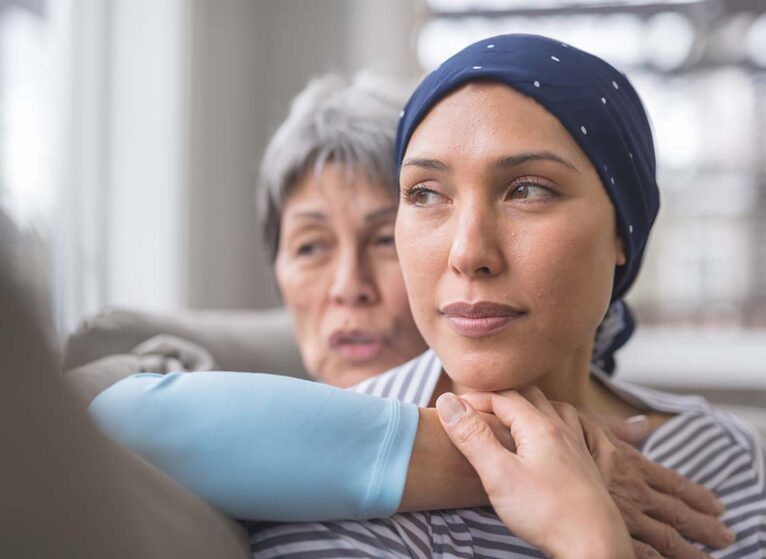A breast cancer diagnosis brings many questions and fears. One of your first is likely, “what treatment will I need?”
The short answer is: usually surgery + it depends. Your treatment should be personalized to you and your specific cancer.
Read on for a review of factors your team will likely consider as they build your treatment plan, plus what they each mean.
Note that this is a general overview and doesn’t cover every nuance involved in treatment. Your treatment plan could end up being different from what you read here. Your personal preferences also affect your plan.
Do I Need Surgery for Breast Cancer?
Most breast cancers are treated with surgery, which is either:
- Lumpectomy: Removes just the cancer and a small rim of healthy tissue around it, leaving most of the breast in place; usually followed with radiation to kill any cancer left behind
- Mastectomy: Removes the whole breast; other treatments may also be needed
Your team may not recommend surgery if you have:
- Stage 4 metastatic cancer: Your cancer has spread to distant organs, like the lungs or brain; main breast tumor usually only removed with surgery if it’s causing pain, bleeding, or infection
- Inflammatory breast cancer: Chemotherapy is used first; surgery may be skipped if the tumor doesn’t respond to chemotherapy
- A serious health condition: You may not be healthy enough for surgery
- Extensive locally advanced disease: The tumor is too large or has invaded nearby structures; chemo or another therapy may be used first to shrink the tumor; surgery may be skipped if the tumor doesn’t shrink
- Lobular carcinoma in situ: Not true cancer — more of a risk marker; often managed with monitoring and/or oral medication rather than surgery
Personal Factors in Breast Cancer Treatment
Your oncologist will consider these personal factors:
- Your age and overall health: Helps determine which treatments you can tolerate
- Menopausal status: Whether you’re close to or have gone through menopause affects decisions about hormone therapy
- Genetic mutations: Includes BRCA1, BRCA2, and other mutations that can affect treatment
- Personal preference: Some patients prioritize more aggressive treatment, while others focus on minimizing side effects
How Your Specific Cancer Affects Treatment
These factors about your specific cancer also determine your treatment.
Type of Breast Cancer
Invasive (Infiltrating)
Breast cancer has spread from the original ducts or lobules into surrounding breast tissue. There are 2 types:
- Invasive ductal carcinoma (IDC): The most common type of invasive (about 80% of cases); it starts in the milk ducts and grows into surrounding breast tissue
What it means: Surgery + possible radiation, chemo, hormone therapy, and/or targeted therapy - Invasive lobular carcinoma (ILC): starts in milk-producing glands (lobules)
What it means: Similar to IDC; hormone therapy is common since most ILCs are hormone receptor-positive
Non-invasive (In Situ)
Breast cancer hasn’t spread beyond the ducts or lobules. There are 2 types:
- Ductal carcinoma in situ (DCIS): Cancer is inside the milk ducts but hasn’t invaded surrounding tissue
What it means: Surgery + radiation + possible hormone therapy; often considered highly treatable - Lobular carcinoma in situ (LCIS): Abnormal cells in the lobules; not considered true cancer but increases risk of later invasive breast cancer in either breast
What it means: Close monitoring + possible preventive medication, or surgery
Less Common Types
- Inflammatory breast cancer (IBC): Rare, aggressive type where cancer blocks lymphatic vessels in the skin of the breast, causing redness, swelling, and warmth
What it means: Treatment usually starts with chemotherapy, then surgery + radiation (opposite of the usual surgery-first approach) - Paget’s disease of the nipple: Rare cancer involving skin of the nipple and areola, often linked to underlying DCIS or IDC
What it means: Surgery + possible radiation + other treatments - Triple-negative breast cancer (TNBC): Has no estrogen, progesterone, or HER2 receptors
What it means: Surgery + chemo is main treatment; chemotherapy may be given before surgery if tumor is larger than 2 cm or lymph nodes are involved; hormone and HER2-targeted therapies won’t be effective
Cancer Stage
- Stage 0 (in situ): Only in ducts or lobules; not invading surrounding tissue
What it means: Usually surgery + possible chemo and/or hormone therapy - Stage I: Small invasive cancer (2 cm or smaller); no or minimal lymph node involvement
What it means: Surgery + possible radiation, chemo, hormone therapy, and/or HER2-targeted therapy - Stage II: Larger tumor (2-5 cm) and/or spread to a few nearby lymph nodes
What it means: Surgery + radiation + chemo + possible hormone therapy and/or possible HER2-targeted therapy - Stage III: Larger tumor (more than 5 cm), extensive lymph node involvement, or cancer in skin/chest wall
What it means: Often chemotherapy first, then surgery + radiation + possible chemo after + possible hormone therapy, and/or HER2-targeted therapy - Stage IV (metastatic): Cancer has spread (metastasized) to distant organs, like the bones, brain, or lungs
What it means: Main treatment is either hormone therapy; chemo + immunotherapy if triple negative; or chemo + HER2-targeted therapy; surgery only if the breast tumor is causing pain, bleeding, or infection
Cancer Grade
- Grade 1 (low-grade/well-differentiated): Cells look fairly normal, grow slowly; less aggressive
What it means: May not need chemo if other risk factors are low - Grade 2 (intermediate/moderately differentiated): Cells look more abnormal, grow faster; intermediate risk
What it means: Treatment depends on stage and receptor status - Grade 3 (high-grade/poorly differentiated): Cells look very abnormal, grow quickly; more aggressive
What it means: Chemo is more likely to be recommended, even in earlier stages
Hormone Receptor Status
New breast cancer diagnosis?
Let's navigate this together.
Your cancer may have estrogen receptors (ER+) and/or progesterone receptors (PR+). ER+ or PR+ means estrogen can cause the cancer to grow.
What it means: If your cancer is hormone-receptor positive (ER/PR+), you may need hormone (endocrine) therapy, which blocks hormones or lowers their levels to slow or stop cancer growth and can lower the risk of the cancer coming back; hormone-receptor negative (ER/PR-) cancers don’t respond to hormone therapy
Human Epidermal Growth Factor Receptor 2 (HER2) Status
HER2 is protein on breast cells that helps them grow and divide. Your cancer can be:
- HER2 positive: Cancer cells make too much HER2, which makes them grow faster; these cancers tend to be more aggressive
- HER2 negative: Normal levels of HER2
What it means: HER2+ cancers can be treated with HER2-targeted therapies that block this protein; usually given in combination with chemotherapy
Genomic Testing
Genomic testing looks at the activity of specific genes in your cancer. Common tests include Oncotype DX or MammaPrint.
This is different from genetic testing, which looks for mutations, like BRCA1 and BRCA2.
Your cancer will be given a recurrence score of:
- Low: The cancer has a low risk of coming back (recurrence)
What it means: You may not need chemo - Intermediate: Your cancer has a medium risk of returning
What it means: Whether you need chemo depends on age and other factors - High: Your cancer has a high risk of returning
What it means: Chemo more likely
Where To Go From Here
Now you have a general idea of what your treatment might look like based on personal factors and your specific cancer.
When you meet with your breast cancer treatment team, they'll help solidify the plan. They'll take into account key personal factors and information about your specific cancer.
Remember, you're not alone in this. Your team is there both to help you build a solid treatment plan and provide individualized support.
Wondering how you'll get through it all? Read how one woman navigated treatment with the right support.


